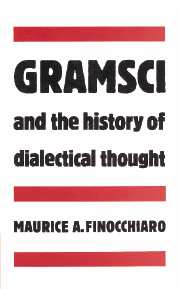Book contents
- Frontmatter
- Contents
- Preface and acknowledgments
- INTRODUCTION: AN APPROACH TO GRAMSCI
- Chapter 1 GRAMSCI'S CROCEAN CRITIQUE OF CROCE'S PHILOSOPHY
- Chapter 2 CROCE AND THE THEORY AND PRACTICE OF CRITICISM
- Chapter 3 GRAMSCI'S METHODOLOGICAL CRITICISM OF BUKHARIN'S SOCIOLOGY
- Chapter 4 BUKHARIN AND THE THEORY AND PRACTICE OF SCIENCE
- Chapter 5 GRAMSCI'S DIALECTICAL INTERPRETATION OF MACHIAVELLI'S POLITICS
- Chapter 6 GRAMSCI'S POLITICAL TRANSLATION OF HEGELIAN-MARXIAN DIALECTIC
- Chapter 7 HEGEL AND THE THEORY AND PRACTICE OF DIALECTIC
- Chapter 8 GRAMSCI AND THE EVALUATION OF MARXISM
- CONCLUSION: DIALECTICAL METHODOLOGY AND TEXTUAL CRITICISM
- Appendix: Concordance of critical edition and English translations
- Notes
- Bibliography
- Index
Chapter 4 - BUKHARIN AND THE THEORY AND PRACTICE OF SCIENCE
Published online by Cambridge University Press: 10 December 2009
- Frontmatter
- Contents
- Preface and acknowledgments
- INTRODUCTION: AN APPROACH TO GRAMSCI
- Chapter 1 GRAMSCI'S CROCEAN CRITIQUE OF CROCE'S PHILOSOPHY
- Chapter 2 CROCE AND THE THEORY AND PRACTICE OF CRITICISM
- Chapter 3 GRAMSCI'S METHODOLOGICAL CRITICISM OF BUKHARIN'S SOCIOLOGY
- Chapter 4 BUKHARIN AND THE THEORY AND PRACTICE OF SCIENCE
- Chapter 5 GRAMSCI'S DIALECTICAL INTERPRETATION OF MACHIAVELLI'S POLITICS
- Chapter 6 GRAMSCI'S POLITICAL TRANSLATION OF HEGELIAN-MARXIAN DIALECTIC
- Chapter 7 HEGEL AND THE THEORY AND PRACTICE OF DIALECTIC
- Chapter 8 GRAMSCI AND THE EVALUATION OF MARXISM
- CONCLUSION: DIALECTICAL METHODOLOGY AND TEXTUAL CRITICISM
- Appendix: Concordance of critical edition and English translations
- Notes
- Bibliography
- Index
Summary
Gramsci's critique of Bukharin requires the same kind of evaluation that had to be undertaken for his critique of Croce. The reasons are the same. First, an attempt should be made to balance the negativism of Gramsci's critique. Second, negative evaluations need more rigorous textual testing than positive ones. Third, we should evaluate more fully Gramsci's criticism. In fact, so far this criticism has been reconstructed primarily as an illustration of Gramsci's philosophy of science and philosophy of praxis; on a few occasions, we also saw that these illustrations were accurate descriptions of Bukharin's work. Now we should examine more systematically to what extent this is so, which will lead us to a reassessment of Bukharin's work.
PHILOSOPHICAL AND POLITICAL IMPORT OF BUKHARIN'S SOCIOLOGY
Any reassessment of Bukharin's Historical Materialism must be mindful of two problems that stem from viewing the book from above and from below – or, respectively, from the viewpoint of the philosophical controversy between mechanists and Deborinites and from the viewpoint of the political debates over social and economic policies. Moreover, in studying each problem one must be careful to distinguish between logical and historical connections.
The controversy over mechanism concerned the intrinsic validity and Marxist character of a philosophical doctrine, widely held in Russia in the 1920s, containing elements of positivism, ontological materialism, and determinism. This mechanism was criticized by the followers of Abram Deborin, who opposed to it a doctrine containing elements of dialectics, idealism, and voluntarism.
- Type
- Chapter
- Information
- Gramsci and the History of Dialectical Thought , pp. 94 - 122Publisher: Cambridge University PressPrint publication year: 1989

